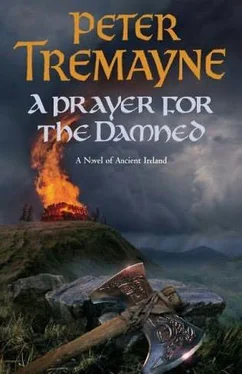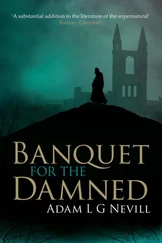Peter Tremayne - A Prayer for the Damned
Здесь есть возможность читать онлайн «Peter Tremayne - A Prayer for the Damned» весь текст электронной книги совершенно бесплатно (целиком полную версию без сокращений). В некоторых случаях можно слушать аудио, скачать через торрент в формате fb2 и присутствует краткое содержание. Жанр: Исторический детектив, на английском языке. Описание произведения, (предисловие) а так же отзывы посетителей доступны на портале библиотеки ЛибКат.
- Название:A Prayer for the Damned
- Автор:
- Жанр:
- Год:неизвестен
- ISBN:нет данных
- Рейтинг книги:4 / 5. Голосов: 1
-
Избранное:Добавить в избранное
- Отзывы:
-
Ваша оценка:
- 80
- 1
- 2
- 3
- 4
- 5
A Prayer for the Damned: краткое содержание, описание и аннотация
Предлагаем к чтению аннотацию, описание, краткое содержание или предисловие (зависит от того, что написал сам автор книги «A Prayer for the Damned»). Если вы не нашли необходимую информацию о книге — напишите в комментариях, мы постараемся отыскать её.
A Prayer for the Damned — читать онлайн бесплатно полную книгу (весь текст) целиком
Ниже представлен текст книги, разбитый по страницам. Система сохранения места последней прочитанной страницы, позволяет с удобством читать онлайн бесплатно книгу «A Prayer for the Damned», без необходимости каждый раз заново искать на чём Вы остановились. Поставьте закладку, и сможете в любой момент перейти на страницу, на которой закончили чтение.
Интервал:
Закладка:
‘Our laws are strict about this game, Eadulf. See, there is Brehon Baithen observing the game to see they are obeyed. To strike a deliberate blow against another player, for example, is punishable by a fine.’
‘There are other laws to protect spectators and, indeed, even to protect the field itself,’ a voice echoed behind them.
They glanced round and found Abbot Augaire standing there, looking amused. ‘I did not think you would have time to watch this diversion,’ he observed.
Fidelma’s chin came up a little. ‘It is not for diversion that we are here, Abbot Augaire,’ she told him. ‘You suggested that we should speak with Fergus Fanat, who is apparently among the players.’
Abbot Augaire smiled. ‘Ah, just so. I should have realised that you would not be attracted to this entertainment when there was an abbot’s murder to be resolved.’
‘Which of the players is Fergus Fanat?’ pressed Fidelma, ignoring his cynical tone.
‘You see the short, muscular man with the long raven-coloured hair? The one now out in front striking at the ball? That is Fergus Fanat. He leads the team from the northern kingdoms against the locals.’
Fidelma realised that her cousin Finguine mac Cathal, Colgú’s heir apparent or tánaiste , was the leader of the second team.
‘How long until the end of the game?’ she demanded.
‘Not long,’ replied Augaire. ‘Three times more must the bowl fill with water.’
He nodded to where Brehon Baithen was standing, another man was sitting before a water clock with which he was timing the progress of the game. The bowl to which Augaire had referred was placed on the surface of a tub of water. It had a small hole in its base so that it gradually filled and sank, after which it was taken out and emptied and the process was repeated. The bowl had to sink a prescribed number of times to measure the length of the game.
Fidelma’s wandering gaze was suddenly attracted by a figure in the crowd behind Brehon Baithen, a slight female figure wearing a religious robe. The girl looked attractive. Her gaze seemed to be fixed on the players on the field as though she was fascinated by the game. For a moment, Fidelma wondered who she was.
Just then there was a shout of protest from the field. The players suddenly bunched into a group, shouting at each other. Brehon Baithen quickly hurried on to the faithche .
‘What is it?’ demanded Eadulf, frowning.
‘One of the players is protesting a foul. He says that two opposing players jostled him before he had possession of the ball.’
The argument seemed short. Brehon Baithen had made some decision and the game recommenced.
Abbot Augaire gave a grunt of satisfaction. ‘Do you realise, my Saxon friend,’ he confided to Eadulf, ‘that it was at the site of my own abbey of Conga, on the plain of Maigh Éo, where it is said the very first recorded game of immán was played?’
‘I knew it was an ancient game,’ Eadulf replied unenthusiastically, anticipating a lecture.
‘It is said that when the Fir Bolg were waging war against the Tuatha Dé Danann it was agreed to settle their differences by playing such a game.’
‘There are many such old tales about the game,’ Fidelma put in quickly. ‘Setanta was said to be the greatest player of his day. Wasn’t it with his ball and stick that he slew the hound of Culann so that he had to offer to replace it and thus earned his new name: Cúchulainn — the hound of Culann?’
There was suddenly a great cheering. The game was apparently over and it became obvious that it was the team from Cashel who had won it.
With a curt nod to Abbot Augaire, Fidelma led the way through the milling crowd to where she had last seen Fergus Fanat. They found him seated with some colleagues, wiping his face on a linen cloth and taking swallows from a goblet of cider. In spite of their defeat, there was good humour among the northern team and much talk of how this or that point should have been played.
Fidelma was aware again of the young female religieuse, who appeared to be waiting on the edge of the group of players. She saw that Eadulf was also examining her with curiosity.
‘Do you recognise her?’ she whispered.
‘I can’t be sure. I think it is one of the two religieuse who accompanied Ultán. I saw them briefly when they arrived.’
While it was not unusual to find a woman so fascinated by the game and with the players, Fidelma found it odd that a member of Ultán’s entourage would have forsaken the mourning of her murdered superior to come down to watch the contest. Then she dismissed the matter from her mind.
Fergus Fanat looked up as Fidelma and Eadulf approached. He rose to his feet, apparently recognising her.
‘I am surprised to see you here, lady.’ He smiled uncertainly, handing his goblet to one of his fellow players.
‘Do you know me, Fergus Fanat?’ she asked.
‘You were pointed out to me when we arrived at your brother’s fortress yesterday.’ He glanced at Eadulf. ‘And you must be Eadulf of Seaxmund’s Ham.’
There was something likeable in the open-featured, friendly scrutiny of the young man. Eadulf smiled back. ‘I am.’
‘I am sorry that the plans for this day have had to be delayed, lady.’ The northern noble turned back to Fidelma. ‘I have heard that Muirchertach Nár has demanded that you conduct his defence. It seems a selfish thing to do in the circumstances.’
Fidelma was thoughtful. ‘Selfish?’
‘Knowing that this was to be your wedding day, he could have chosen another to represent him in law.’
‘It is his right to demand whom he pleases in his defence,’ Fidelma pointed out. ‘When a man, even a king, is accused of murder, then he is entitled to some degree of selfishness.’
Fergus Fanat chuckled. ‘You are right, lady. I suppose that I am not overly concerned at the death of Ultán.’
‘That is precisely why I have sought you out.’
A look of surprise crossed Fergus Fanat’s features. ‘To talk of my lack of concern?’ He gestured around him. ‘I think you will be hard pressed to find many who will mourn him.’
‘To talk of the reasons why that is so. Why is there this unconcern over the murder of an abbot from your own territory?’ She glanced at the man’s fellow players, several of whom were standing within hearing of their conversation, and added: ‘I am sorry. Perhaps you would like to walk with us awhile?’
Fergus Fanat put down his towel and nodded.
‘I need to return to the fortress to bathe,’ he said. ‘The game was quite arduous. Let us go back.’
They fell in step, Fergus Fanat walking between Fidelma and Eadulf, as they crossed the field. The spectators were quickly vanishing but for a few people here and there engaged in talk. No one bothered them. Again Fidelma was aware of the young religieuse. The girl stood hesitantly and then, noticing that Fidelma had glanced at her, turned and hurried away after the crowd.
‘I presume that you did not like Abbot Ultán?’ Fidelma began.
‘I did not kill him, if that is where your questions are leading, lady,’ replied Fergus Fanat quickly and with assurance.
‘They are not. . as yet.’ She smiled. ‘Why didn’t you like him?’
‘He was not a likeable person.’
‘Surely that depends on an individual’s subjective view? Even the worst people are often liked, even loved, by someone,’ Eadulf pointed out.
Fergus Fanat laughed with good humour. ‘Forgive me, Brother Eadulf. I am no philosopher. I am a simple warrior.’
‘In the service of Blathmac, king of Ulaidh?’
‘In the service of my cousin,’ confirmed the young man, laying slight emphasis on his relationship to the king.
Читать дальшеИнтервал:
Закладка:
Похожие книги на «A Prayer for the Damned»
Представляем Вашему вниманию похожие книги на «A Prayer for the Damned» списком для выбора. Мы отобрали схожую по названию и смыслу литературу в надежде предоставить читателям больше вариантов отыскать новые, интересные, ещё непрочитанные произведения.
Обсуждение, отзывы о книге «A Prayer for the Damned» и просто собственные мнения читателей. Оставьте ваши комментарии, напишите, что Вы думаете о произведении, его смысле или главных героях. Укажите что конкретно понравилось, а что нет, и почему Вы так считаете.












